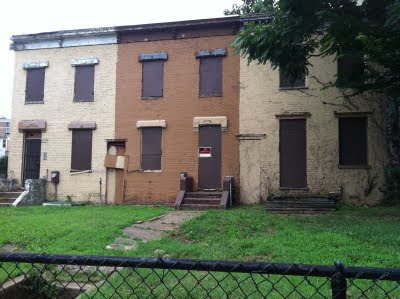The DC government has ruled three nineteenth-century row houses in DC's Mount Vernon Square Historic District must be preserved, giving some resolution - at least for now - to a long-running saga that spotlighted tensions surrounding urban church parking and historic preservation.
On Thursday, the city released its most recent ruling that the Third Street Church of God, located in DC's Mount Vernon Square Historic District, must continue to preserve three nineteenth century row houses it owns at 1232, 1234, and 1236 New Jersey Avenue NW. Last year the Church petitioned the Historic Preservation Office (HPO) for permission to totally demolish the homes, built in the 1860's, to make way for parking. It argued saving the buildings would constitute an "economic hardship." The HPO rejected the permit, so the Church requested that the office of the Mayor's Agent hear the case.
The Church first announced plans to demolish the structures last year, but the HPO recommended only partial demolition, as it stated in a staff report that parts of the houses still had structural integrity to justify saving. The Church changed its plans to comply with the HPO's recommendation, and the Historic Preservation Review Board (HPRB), the HPO's decision-making body, approved that permit. The church went forward with the demolition, but then decided to make the case for a full demolition permit again. It was that permit that the city again rejected on Thursday.
Mayor's Agent hearing officer J. Peter Byrne wrote in the ruling released Thursday that historic preservation trumped the Church's economic hardship argument. Byrne wrote that the church's plans to use its property to serve its programming deserved "great respect," but that the Church "must pursue its facility goals within the constraints of the Historic Landmark and Historic District Protection Act, which benefits both the surrounding neighborhood and entire District of Columbia."
According to public record, the Church bought the row houses over 20 years ago for $98,400, but their 2011 assessed tax value was more than $500,000 - almost the exact same amount as the church's annual revenues. In any case, the city ruled, the church's economic hardship argument doesn't stand, as securing the buildings for the Church's original estimated cost of $77,420 "does not seem prohibitive in light of the Church's revenues and assets." The best option, the city suggested, might be for the church to avoid any expense to itself at all and just sell the row houses.
Washington DC real estate news
 |
| 1232, 1234, and 1236 New Jersey Avenue, NW. Image: HPO |
The Church first announced plans to demolish the structures last year, but the HPO recommended only partial demolition, as it stated in a staff report that parts of the houses still had structural integrity to justify saving. The Church changed its plans to comply with the HPO's recommendation, and the Historic Preservation Review Board (HPRB), the HPO's decision-making body, approved that permit. The church went forward with the demolition, but then decided to make the case for a full demolition permit again. It was that permit that the city again rejected on Thursday.
Mayor's Agent hearing officer J. Peter Byrne wrote in the ruling released Thursday that historic preservation trumped the Church's economic hardship argument. Byrne wrote that the church's plans to use its property to serve its programming deserved "great respect," but that the Church "must pursue its facility goals within the constraints of the Historic Landmark and Historic District Protection Act, which benefits both the surrounding neighborhood and entire District of Columbia."
According to public record, the Church bought the row houses over 20 years ago for $98,400, but their 2011 assessed tax value was more than $500,000 - almost the exact same amount as the church's annual revenues. In any case, the city ruled, the church's economic hardship argument doesn't stand, as securing the buildings for the Church's original estimated cost of $77,420 "does not seem prohibitive in light of the Church's revenues and assets." The best option, the city suggested, might be for the church to avoid any expense to itself at all and just sell the row houses.
Washington DC real estate news














